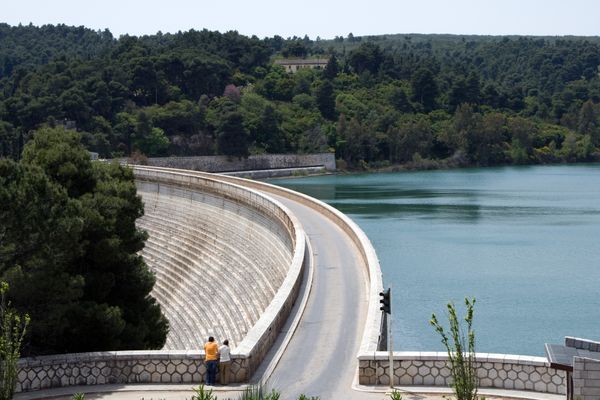2.3.3
Development of Knowledge
Development of Knowledge
Development of Knowledge
Knowledge was valued for its practical uses in the Islamic world. It made it possible to follow the teachings of Islam, alongside other scholarly fields.


The Islamic Golden Age
The Islamic Golden Age
- The Islamic Golden Age was a period of intellectual, economic, cultural, and scientific prosperity in the Muslim world.
- This period lasted from approximately the 8th to the 13th century.
- In the 11th century, the caliph and rich citizens built madrasas, an early form of university.
- This shows how important the development of knowledge was to the centre of the Muslim world.
- This approach relied on the wealth of rich citizens, who set up organisations and funded research.


Astronomy and astrology
Astronomy and astrology
- Astronomy is the study of the planets, stars, and space.
- Astrology is the study of the movement of the stars and planets and their impact on the world.
- Arab scholars used ancient Greek and Hindu knowledge of the stars to calculate the direction of Makkah (Mecca) for prayer.
- Muslims often pray in this direction.
- They built upon the work of astronomers such as Ptolemy, a Greek astronomer from the 2nd century AD.
- Astronomy was used to determine an accurate calendar for navigation and religious purposes.


Mapping via the stars
Mapping via the stars
- Large observatories were built to study the stars and planets.
- Scholars made detailed globes to show the position of stars and planets to Earth.
- The astrolabe was an invention that travellers used to find their position using the stars.
- Al-Masudi, a 10th-century Arab geographer, used the stars and his own travels to create great maps.


Mathematics
Mathematics
- Islamic scholars studied the mathematics of various countries, including Greece, India, and China.
- Geometry (the maths of points lines and shapes) and trigonometry (the maths of triangles) saw a lot of development.
- Al-Khwarizmi and Omar Khayyam, two Islamic mathematicians, helped develop algebra into its own field of mathematics.
- Al-Khwarizmi helped introduce the Hindu decimal system to the Arab world.


Engineering
Engineering
- The Islamic Empire lacked water. Much of their engineering efforts went into transporting water in a safe and efficient way.
- Engineers developed and refined dams, canals, waterwheels, aqueducts, pumps and cisterns.
- This shows that the development of knowledge had intellectual and practical purposes.
- Other areas which saw development included mechanics, clocks, wind, power and chemistry.
1The Medieval World: 450-1450 AD
1.1Anglo-Saxon England
1.2The Contest for the English Throne
1.3Conquering the Holy Land, 10-96-1396 AD
1.3.1Origins of the Crusades
1.3.2Early Disputes Over the Holy Land
1.3.3The First Crusade
1.3.4Course of the Crusades
1.3.5Reasons for the Crusades
1.3.6Military Impact of the Crusades
1.3.7Scientific Impact of the Crusades
1.3.8Domestic Impact of the Crusades
1.3.9Christian Interpretation of the Crusades
1.3.10Muslim Interpretation of the Crusades
1.3.11End of Topic Test - The Crusades
1.3.12End of Topic Test - The Crusades 2
1.4King John
1.5The Magna Carta & Parliament
1.5.1The Magna Carta
1.5.2Lasting Impact of the Magna Carta
1.5.3The Magna Carta & the Monarchy
1.5.4The Magna Carta & Democracy
1.5.5Contemporary Interpretations of King John
1.5.6Later Interpretations of King John
1.5.7Modern Interpretations of King John
1.5.8End of Topic Test - The Magna Carta
1.5.9End of Topic Test - Lasting Impact of Magna Carta
1.5.10End of Topic Test - Interpretations of King John
1.6The Black Death
2Worldviews
2.1Time & History
2.2The Christian World
3The Empire of Mali
4The Renaissance & Reformations, 1500-1598 AD
4.1The Renaissance
4.2The Reformation
5The British Empire, 1583-1960 AD
5.1The British Empire
5.2North America
5.3The Caribbean
5.4India
5.5Australia
6The Peasants' Revolt
6.1Causes of the Peasants' Revolt
6.2Course of the Revolt
6.3Consequences of the Peasants Revolt
7Religion in the Middle Ages
8Slavery, 1619-1833 AD
8.1Slavery
8.1.1Beginnings of the Slave Trade
8.1.2The Triangular Slave Trade
8.1.3Impact of the Slave Trade on Britain
8.1.4Slave Trade & World Impacts
8.1.5Reasons Attitudes to the Slave Trade Changed
8.1.6The Committee for the Abolition
8.1.7The Abolition of Slavery: Key Events
8.1.8Interpretations of the Slave Trade
8.1.9Interpretations of Abolition
8.1.10End of Topic Test - Slavery
9The English Civil War, 1642-1660
9.1Charles I
9.2Why Did the Civil War Break Out?
9.3The Civil War
9.4The Commonwealth
10The Industrial Revolution, 1750-1840
11US Independence, 1775-1783
12The French Revolution, 1789-1815
12.1The Revolution
13The British Empire, 1857–1930
13.1The British Empire
13.1.1Empires over Time
13.1.2Expansion into Africa
13.1.3Motives for Expansion into Africa
13.1.4History of Egypt
13.1.5The British Empire & India
13.1.6The Bengal Famine, Indian Mutiny & Indian Economy
13.1.7International Relations with other Powers
13.1.8Scramble for Africa
13.1.9The Berlin Conference & Assessment
13.1.10Native Policy in Colonies
13.1.11Relations & Business with Iran
13.1.12Iran After WW2
13.1.13Impact of WW1
13.1.14Indian & African Support for the British in WW1
13.1.15Palestine & the Middle East
13.1.16Britain & its African & Middle Eastern Colonies
14Suffrage
14.1Suffrage
14.2The Campaign for Women’s Suffrage
14.3Women’s Enfranchisement
15World War 1, 1914-1918
15.1Causes of WW1
15.2Outbreak & Early War
15.3The War of Attrition
15.4Forgotten Armies of WWI
16The Inter-War Years, 1919-1939
16.1Increasing Support for Fascists
16.2Control of People in Totalitarian States
16.2.1The German Police State
16.2.2The Gestapo & SS
16.2.3The Success of Repression
16.2.4The USSR Police State
16.2.5Employment in Germany
16.2.6Economic Policies in Germany
16.2.7Nazi Economic Policy - Costs & Benefits
16.2.8Economic Policies in USSR
16.2.9The Jews & Anti-Semitism
16.2.10The Persecution of the Jews - The Holocaust
16.2.11Cult of Personality in the USSR
16.3The Rise of Dictators
17World War 2, 1939-1945
17.1World War 2
17.1.1Long Term Factors of WW2
17.1.2Hitler & the Nazis
17.1.3Appeasement
17.1.4The Phoney War
17.1.5The Blitzkrieg
17.1.6The Battle of Britain
17.1.7German Invasion of the USSR
17.1.8US Entrance into WW2
17.1.9Allied Victory
17.1.10Churchill
17.1.11Anti-Semitism
17.1.12The Holocaust
17.1.13Outcome of WW2
17.1.14Interpretations of the Causes of WW2
17.1.15Interpretation of US Entrance
17.1.16Interpretation of USSR Entrance
18The Cold War, 1947-1962
18.1The Cold War
18.1.1Introduction to Key Terms of the Cold War
18.1.2Ideological Differences Between the Superpowers
18.1.3The Yalta & Potsdam Conferences - 1945 AD
18.1.4Satellite States
18.1.5The Atomic Bomb
18.1.6NATO
18.1.7Containment
18.1.8The Marshall Plan
18.1.9The Berlin Crisis
18.1.10The Berlin Airlift
18.1.11The Refugee Problem in Berlin
18.1.12The Berlin Wall
18.1.13The Arms Race
18.1.14The Space Race
18.1.15Relations with Cuba
18.1.16The Cuban Missile Crisis
18.1.17Consequences of the Cuban Missile Crisis
19Civil Rights in the USA, 1954-1975
19.1Segregation in the USA
19.1.1Segregation & Discrimination
19.1.2Voting
19.1.3Brown v. Topeka
19.1.4Little Rock High School
19.1.5Rosa Parks
19.1.6Martin Luther King Jr.
19.1.7Opposition to the Civil Rights Movement
19.1.8The Murder of Emmett Till
19.1.9The James Meredith Case
19.1.10Peaceful Protests in the 1960s
19.1.11Freedom Summer & Mississippi Murders
19.1.12Civil & Voting Rights Acts
19.1.13Presidents Kennedy & Johnson
19.1.14The Riots of 1965–67
19.1.15The Kerner Report
19.1.16Martin Luther King's Campaign
19.1.17Assassination of Martin Luther King
19.1.18Consequences of Assassination of MLK
Jump to other topics
1The Medieval World: 450-1450 AD
1.1Anglo-Saxon England
1.2The Contest for the English Throne
1.3Conquering the Holy Land, 10-96-1396 AD
1.3.1Origins of the Crusades
1.3.2Early Disputes Over the Holy Land
1.3.3The First Crusade
1.3.4Course of the Crusades
1.3.5Reasons for the Crusades
1.3.6Military Impact of the Crusades
1.3.7Scientific Impact of the Crusades
1.3.8Domestic Impact of the Crusades
1.3.9Christian Interpretation of the Crusades
1.3.10Muslim Interpretation of the Crusades
1.3.11End of Topic Test - The Crusades
1.3.12End of Topic Test - The Crusades 2
1.4King John
1.5The Magna Carta & Parliament
1.5.1The Magna Carta
1.5.2Lasting Impact of the Magna Carta
1.5.3The Magna Carta & the Monarchy
1.5.4The Magna Carta & Democracy
1.5.5Contemporary Interpretations of King John
1.5.6Later Interpretations of King John
1.5.7Modern Interpretations of King John
1.5.8End of Topic Test - The Magna Carta
1.5.9End of Topic Test - Lasting Impact of Magna Carta
1.5.10End of Topic Test - Interpretations of King John
1.6The Black Death
2Worldviews
2.1Time & History
2.2The Christian World
3The Empire of Mali
4The Renaissance & Reformations, 1500-1598 AD
4.1The Renaissance
4.2The Reformation
5The British Empire, 1583-1960 AD
5.1The British Empire
5.2North America
5.3The Caribbean
5.4India
5.5Australia
6The Peasants' Revolt
6.1Causes of the Peasants' Revolt
6.2Course of the Revolt
6.3Consequences of the Peasants Revolt
7Religion in the Middle Ages
8Slavery, 1619-1833 AD
8.1Slavery
8.1.1Beginnings of the Slave Trade
8.1.2The Triangular Slave Trade
8.1.3Impact of the Slave Trade on Britain
8.1.4Slave Trade & World Impacts
8.1.5Reasons Attitudes to the Slave Trade Changed
8.1.6The Committee for the Abolition
8.1.7The Abolition of Slavery: Key Events
8.1.8Interpretations of the Slave Trade
8.1.9Interpretations of Abolition
8.1.10End of Topic Test - Slavery
9The English Civil War, 1642-1660
9.1Charles I
9.2Why Did the Civil War Break Out?
9.3The Civil War
9.4The Commonwealth
10The Industrial Revolution, 1750-1840
11US Independence, 1775-1783
12The French Revolution, 1789-1815
12.1The Revolution
13The British Empire, 1857–1930
13.1The British Empire
13.1.1Empires over Time
13.1.2Expansion into Africa
13.1.3Motives for Expansion into Africa
13.1.4History of Egypt
13.1.5The British Empire & India
13.1.6The Bengal Famine, Indian Mutiny & Indian Economy
13.1.7International Relations with other Powers
13.1.8Scramble for Africa
13.1.9The Berlin Conference & Assessment
13.1.10Native Policy in Colonies
13.1.11Relations & Business with Iran
13.1.12Iran After WW2
13.1.13Impact of WW1
13.1.14Indian & African Support for the British in WW1
13.1.15Palestine & the Middle East
13.1.16Britain & its African & Middle Eastern Colonies
14Suffrage
14.1Suffrage
14.2The Campaign for Women’s Suffrage
14.3Women’s Enfranchisement
15World War 1, 1914-1918
15.1Causes of WW1
15.2Outbreak & Early War
15.3The War of Attrition
15.4Forgotten Armies of WWI
16The Inter-War Years, 1919-1939
16.1Increasing Support for Fascists
16.2Control of People in Totalitarian States
16.2.1The German Police State
16.2.2The Gestapo & SS
16.2.3The Success of Repression
16.2.4The USSR Police State
16.2.5Employment in Germany
16.2.6Economic Policies in Germany
16.2.7Nazi Economic Policy - Costs & Benefits
16.2.8Economic Policies in USSR
16.2.9The Jews & Anti-Semitism
16.2.10The Persecution of the Jews - The Holocaust
16.2.11Cult of Personality in the USSR
16.3The Rise of Dictators
17World War 2, 1939-1945
17.1World War 2
17.1.1Long Term Factors of WW2
17.1.2Hitler & the Nazis
17.1.3Appeasement
17.1.4The Phoney War
17.1.5The Blitzkrieg
17.1.6The Battle of Britain
17.1.7German Invasion of the USSR
17.1.8US Entrance into WW2
17.1.9Allied Victory
17.1.10Churchill
17.1.11Anti-Semitism
17.1.12The Holocaust
17.1.13Outcome of WW2
17.1.14Interpretations of the Causes of WW2
17.1.15Interpretation of US Entrance
17.1.16Interpretation of USSR Entrance
18The Cold War, 1947-1962
18.1The Cold War
18.1.1Introduction to Key Terms of the Cold War
18.1.2Ideological Differences Between the Superpowers
18.1.3The Yalta & Potsdam Conferences - 1945 AD
18.1.4Satellite States
18.1.5The Atomic Bomb
18.1.6NATO
18.1.7Containment
18.1.8The Marshall Plan
18.1.9The Berlin Crisis
18.1.10The Berlin Airlift
18.1.11The Refugee Problem in Berlin
18.1.12The Berlin Wall
18.1.13The Arms Race
18.1.14The Space Race
18.1.15Relations with Cuba
18.1.16The Cuban Missile Crisis
18.1.17Consequences of the Cuban Missile Crisis
19Civil Rights in the USA, 1954-1975
19.1Segregation in the USA
19.1.1Segregation & Discrimination
19.1.2Voting
19.1.3Brown v. Topeka
19.1.4Little Rock High School
19.1.5Rosa Parks
19.1.6Martin Luther King Jr.
19.1.7Opposition to the Civil Rights Movement
19.1.8The Murder of Emmett Till
19.1.9The James Meredith Case
19.1.10Peaceful Protests in the 1960s
19.1.11Freedom Summer & Mississippi Murders
19.1.12Civil & Voting Rights Acts
19.1.13Presidents Kennedy & Johnson
19.1.14The Riots of 1965–67
19.1.15The Kerner Report
19.1.16Martin Luther King's Campaign
19.1.17Assassination of Martin Luther King
19.1.18Consequences of Assassination of MLK

Unlock your full potential with GoStudent tutoring
Affordable 1:1 tutoring from the comfort of your home
Tutors are matched to your specific learning needs
30+ school subjects covered